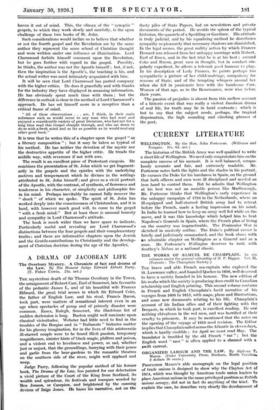THE GOSPEL OF ST. JOHN
No gospel begins so abruptly and magnificently as St. John's, and no book of the New Testament except the Revelation could have provided an plain a shock to the orthodox Jewish reader. Philo had philosophized upon the Word of God, but his conception was rather vague and fanciful. It seems probable that the idea Was more energetically and deeply understood.in Egypt than Plulo could gueet ' thefe is a grave dispute about dates involved here and it would- be best to leave it sleeping.. _ _ For five verses, then, St. John states in its pure abstract form the metaphysical doctrine of the creation: Suddenly he interrupts with a most concrete historical fientre,'. John the Baptist. He. continues his- abstract' doctrine ; -but' inost unbelievably and _startlingly; it nil-1st have 'seemed, identifies the metaphysical principle of creation with a man, Jesus Christ.
And in the Revelation the procedure is as abrupt.- John sees a figure hie unto the Son of Man, and all the attributes in which he. clothes this .figure are iacred tOthe Aheient of Days, never used except of the Almighty. It St. John is blasphemous, then he is outrageously and:Ideliberately and unflinchingly blasphemous. Both in the RiVelition and in the gospel, he begins_sidth the statement -of- ttiethristhood of Jesus and-never-, leaves it out of mind. This, the climax_ of the " synoptic " gospels, to which they work slowly and carefully, is the open challenge of these two books of St. John.
Such considerations would incline us to believe that whether or not the fourth gospel and the Revelation are by the same author they represent the same school of Cluistian thought and were written under one influence or illumination. Lord Charnwood forbids himself comment upon the Revelation, but he goes further with regard to. the gospel. Possibly, be thinks, the author was not the Apostle himself ; , but, if not, then the inspiration is the Apostle's, the teaching is -his, and the actual writer was most intimately acquainted -with him.
• It will be seen that Lord Charnwood has parted company with the higher critics. He does it gracefully and with thanks for the industry they have displayed in amassing information. He has obviously spent much time with them ; but the difference in outlook is clear in the method of Lord Chamwood's approach. He has set himself more in a receptive than a critical frame of mind.
"All of these observations . . . are, I think, in their main substance such as would occur to any man who had read and enjoyed a considerable variety of great literature, who had not for a long time read this Gospel straight through, and who sat down to do so with a fresh mind and so far as possible as he would read any other good book."
It is true that he writes this of a chapter upon the gospel "as a literary composition " ; but it may be taken as typical of his method. He has neither the devotion of the mystic nor the destructive appetite of the higher critic. He treads the middle way, with reverence if not with awe.
The result is an excellent piece of Protestant exegesis. He combines the presentation of St. John which we get fragment- arily in the gospels and the epistles with the underlying motives and temperament which he divines in the writings attributed to St. John himself ; and gives us a vivid portrait of the Apostle, with the contrast, of synthesis, of fierceness and tenderness in his character, ot simplicity and philosophic fire in his mind. Perhaps inevitably he cannot fully recover the " shock " of which we spoke. The spirit of St. John has worked deeply into the consciousness of Christendom, and it is hard, with however much good will, to come to the gospel
"with a fresh mind." But at least, there is unusual honesty . .
and sympathy in Lord Chamwood's attitude.
The book is much wider than we have space to indicate. Particularly useful and revealing are Lord Charnwood's distinctions between the four gospels and their complementary truths ; and there are informative chapters upon the Jewish and the Gentile contributions to Christianity and the develop- ment of Christian doctrine during the age of the Apostles:



















































 Previous page
Previous page